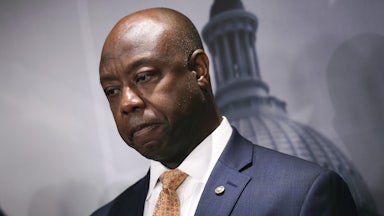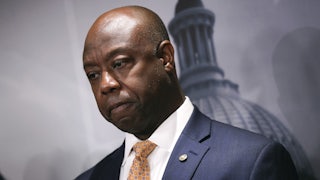In the 12 months since the Supreme Court struck down Roe v. Wade, Republican legislators across the country have devoted themselves to advancing draconian, unpopular abortion bans. One popular media narrative portrays these extreme bans as a liability for the party—a “runaway train” provoking “political backlash.” When the bans fail, they are cast as “a reflection of the growing unease among Republicans over the political popularity of strict bans.” National Republicans, meanwhile, are said to be backing away from these extreme bans: Even Trump, some coverage claims, won’t back a federal ban (earning him the ire of anti-abortion groups).
This is a reassuring narrative. But it doesn’t hold up to scrutiny: When you look closely at which abortion bans are described as extreme and which bans are called compromises, it’s clear that if the Republican Party is backing away from near-total abortion bans, it is proudly supporting bans with only minor allowances. Both the anti-abortion judges that Republican presidents have put on the courts and Republicans’ tolerance for extremists suggest a party ready to steamroll over any dissent: Whether abortion bans are popular or not, Republicans are counting on getting their way.
Although some GOP presidential candidates, like Trump, won’t say whether they personally would back a federal abortion ban, it would be dangerous to presume that’s a political calculation due to broad support for abortion access—or that this reticence will last. The idea of a federal ban was unthinkable until very recently. That we are considering this question is a sign of how thoroughly anti-abortion groups have gained ground for even unpopular abortion laws since the Dobbs decision.
For instance, when Senator Lindsey Graham introduced his 15-week federal ban in the Senate last September, what pushback the ban got from Republicans was disingenuous and self-serving. Some positioned the push for a national ban as problematic because it compromised their already dubious talking point after Dobbs that abortion is a matter left to the states. Some in the party fretted that it would draw voters’ attention back to abortion generally and harm them at the ballot box. There was little to no pushback at the idea that 15 weeks was too extreme to support. This makes it all the more bizarre that 15-week bans are now being characterized by the media as a retreat from extremism. (On a conservative radio show in April, Wisconsin Republican Representative Derrick Van Orden suggested this would be a compromise with “radical” Democrats.) Either way, such claims of moderation serve the interest of both the Republican Party and the anti-abortion movement.
Then there’s the tactic of saying a federal ban is “unrealistic,” as Republican presidential candidate Nikki Haley did in her “Consensus on Abortion” speech in April at the Susan B. Anthony List headquarters in Arlington, Virginia. Haley wasn’t saying she didn’t support a federal ban because it was too extreme, but because the Senate lacked the votes. Contrary to what was said by “fearmongers,” Haley added, “No Republican president will have the ability to ban abortion nationwide, just as no Democratic president can override the laws of all 50 states.” Is this supposed to signal a willingness to compromise?
There’s no getting around the fact that, as governor of South Carolina, Haley backed the kind of abortion ban that once inspired thousands of protesters to occupy state legislatures. In her April speech, Haley proudly recalled voting for “every pro-life bill” that crossed her desk as state representative and signing a 20-week ban as governor. Does 20 weeks sound moderate? When Texas state Senators Wendy Davis and Leticia Van de Putte filibustered a proposed abortion ban 10 years ago, gaining national attention for this dramatic 13-hour standoff, what led protesters to pack the massive Capitol rotunda in Austin was a 20-week abortion ban.
When Republican candidates and other elected officials make statements about not supporting a federal ban, that’s typically because the post-Roe talking point they are supposed to be adhering to is to leave abortion to the states. So let’s look at the states.
One unquestionably strict law is West Virginia’s near-total abortion ban, passed shortly after Roe was overturned. This ban requires that a rape is reported to police within 48 hours to qualify for a rape exception, and was designed to shut down the one abortion-providing clinic in the state. It reportedly passed, as The Washington Post put it, “only after moderates pushed to eliminate any criminal penalties for doctors.” Is preferring not to jail doctors considered an exclusively “moderate” position now?
In North Carolina, Republicans considering exceptions to a 12-week ban for rape and incest were said to be finding “middle ground,” in a bill described as “not nearly as severe as bans that have been embraced by conservative states.” In fact, calling it a 12-week ban can be misleading: While surgical abortions are banned at 12 weeks, medication abortion in North Carolina is banned at 10 weeks. On top of that, for medication abortion, the law mandates two to three separate in-person appointments with a provider, with a 72-hour waiting period between each appointment.
To state the obvious, you can only characterize North Carolina’s bill as “not nearly as severe” because of how popular these near-total bans have become among Republican legislators, including very new ones. Despite Democratic Governor Roy Cooper’s veto of the ban, the legislature was able to override him with a single vote from a Republican state representative, Tricia Cotham, who as recently as April was a Democrat who ran on defending abortion rights. “Now more than ever we need leaders who will be unwavering and unapologetic in their support of abortion rights,” Cotham said in May 2022 on Twitter, pledging that in the state legislature she’d “fight to codify Roe.”
Not only did Cotham abandon that pledge; when she became a Republican, she gave GOP members of the state’s General Assembly a veto-proof majority and on May 16 voted with her new party to overrule the governor’s veto. The ban is due to go into effect July 1.
Then there’s South Carolina, where a near-total ban was introduced this session. When the state’s five women senators joined to filibuster the ban, they were hailed for protecting abortion from severe bans, and their effort was reported as evidence of the “failure” of “strict” laws to advance in even conservative states. Yet despite their headline-grabbing filibuster in late April against the near-total ban, two of those senators also voted for a six-week ban—effectively a near-total ban, since few people know they are pregnant at six weeks. That six-week ban has since passed, been signed, and has been temporarily blocked by a state judge, pending a legal challenge.
Debating weeks and exceptions are a trap, meant to force abortion rights groups to defend laws that they oppose if only to stave off worse ones. As the Carolina Abortion Fund, which provides funding for abortion and associated costs in North and South Carolina, said earlier in the session, “regardless of any week, any exception … any ban against abortion is an extreme outside of the will of the constituency.”
The abortion bans in the Carolinas passed the same week Nebraska legislators considered a 12-week abortion ban, merging it with already incredibly contentious legislation on banning gender-affirming care for transgender youth. State Senators Machaela Cavanaugh, Jen Day, and Megan Hunt had filibustered the latter bill all session long, in a rare instance of pushback (made possible in part because of the state’s unicameral, nonpartisan legislature).
Some of their colleagues have not tolerated this dissent. Senator Cavanaugh was threatened with censure, and an investigation into Senator Hunt, who has a trans child, was opened over an alleged “conflict of interest.” What does it mean, then, that anti-abortion lawmakers thought it made sense to add their new attempt at an abortion ban to the one bill these senators have spent weeks blocking? To circumvent the rules and undermine their opponents—and so on May 19, amid large protests from constituents, whose chants were heard in the chamber, and who were banned from holding signs within view of their elected representatives, the legislature voted to pass the dual abortion and trans care bill. Nebraska’s governor signed it into law in late May, though it was immediately challenged in court.
Finally, we come to Florida, where we have a two-for-one example of Republican swagger on the issue: Governor Ron DeSantis signed a six-week abortion ban in April. After declaring his presidential candidacy the following month, DeSantis accused Democrats of “trying to nationalize abortion all the way up until birth.” Yet Democratic efforts to codify Roe into federal law are stalled out, and, in any case, Roe only established the right to abortion before fetal viability, around 24 weeks. In the same interview with Fox, DeSantis called any federal attempt to protect abortion access “an abuse of power.”
This stands in stark contrast to his own abuses: his intent to chill the opposition by demanding the prosecution of abortion-rights activists. The door for DeSantis to demand this, significantly, was opened with the Department of Justice’s enforcement of the Freedom of Access to Clinic Entrances Act, a law meant to protect clinics and patients from anti-abortion protesters. Federal prosecutors charged four abortion rights activists with offenses that carry a potential sentence of 12 years in prison. They stand accused of spray-painting pro-abortion slogans on the exterior walls of a fake abortion clinic in South Florida.
In all, 16 states put near-total bans in effect over the course of 2022, according to the Guttmacher Institute, which concludes, “Combined with the implementation of pre-Roe laws and trigger bans that had been enacted in previous years, these laws have restricted abortion access for millions of people.” That’s the reality, popularity or political feasibility or number of votes gained or lost be damned: There are millions of people who are denied an abortion in this country already. The people forced to give birth; the people whose doctors are telling them to carry dangerous, wanted pregnancies to term; the people who risk criminalization by requesting packets of mifepristone and misoprostol for medication abortion through the mail—these are all just a preview of what Republicans are working toward.
In fact, the definition of “extreme” has narrowed even within the past couple of weeks: At a campaign event in New Hampshire not long after her speech at the Susan B. Anthony List headquarters, Haley announced that, as president, she would in fact back a federal abortion ban should it land on her desk, despite her having earlier said that such a ban was impractical. Haley still draped her promise to sign a federal ban in self-aggrandizing rhetoric, claiming that “no one has been honest” with the voters that such a ban was unlikely to pass Congress—as if competently counting possible votes is what distinguishes her from her Republican rivals.
Remember, too, that for years we were told how “unlikely” overturning Roe was—until it was not. As Trump posted on Truth Social, just a few days before Haley’s remarks in New Hampshire, “Without me there would be no 6 weeks, 10 weeks, 15 weeks, or whatever is finally agreed to. Without me the pro Life movement would have just kept losing.” When you’ve already conceded that it is proper for the state to compel people to carry a pregnancy to term using the blunt force of criminal law, weeks are just a bargaining chip in how reproductive coercion will be enforced.
Look how quickly after Dobbs we’ve landed in this reality: Extreme restrictions on abortion are now so common that once unthinkable laws can be framed as compromises or even wins. News that some Republicans are unwilling to sign on to near-total bans should not be dignified with the narrative that the party as a whole is backing away from abortion bans. And when national Republicans dodge questions about a federal ban only to say they prefer to leave it to the states, while those states are pushing bans even more extreme than the current federal ban up for debate, we should absolutely interpret such statements as the candidates’ support for these extreme state bans. Finally, while those bans may indeed be unpopular with many voters, it’s worth remembering that states with near-total abortion bans are also some of the most gerrymandered states in the nation. These days, you can be a Republican officeholder who embraces election denialism and not only get reelected but even get a promotion. Voters may say they want their right to an abortion back, but what voters want is no protection against this party’s extremism.
This article has been updated.










